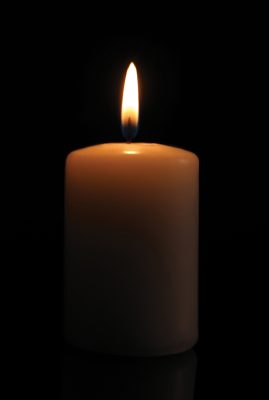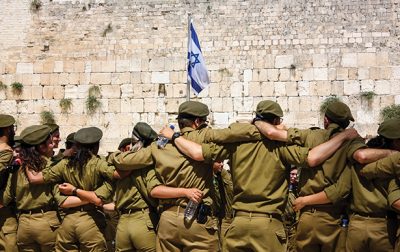×


We have detected your country as:
Please click here to go to the USA website or select another country from the dropdown list.
by: Janet Aslin, BFP Staff Writer
Since the first time I heard its haunting melody, I have been drawn to the short Jewish liturgical piece put to music entitled “Vehi Sheamda.” The words of the title are translated, “And it is this that has stood,” with the word “this” meaning God’s covenant relationship with Abraham and his descendants. The song goes on to state how, in every generation, enemies have arisen against the Jewish people, seeking their destruction and utter annihilation. However, this is a song of ultimate hope in God during such times.
 A Pesach Melody
A Pesach Melody“Vehi Sheamda” is a Pesach or Passover song, originally found in the Haggadah (“Telling”), the centerpiece of the Seder meal. Jewish families around the world sing it in remembrance of how God brought them out of slavery in Egypt. In light of Jewish history over the millennia since their Exodus, it is not surprising that this short poem put to music has gained audiences in times when the Jewish people’s very existence is threatened and not only during the annual Seder meal.
Originally written in Hebrew and sung since the early eighth century, there are various English translations. Rabbi Dr. Marcus Lehmann translated the following version. It appears in the Lehmann Haggadah.
And it is this [the Torah] that has stood by our ancestors and for us.
For not only one [enemy] has risen up against us to destroy us,
but in every generation they rise up to destroy us.
But the Holy One, Blessed be He, delivers us from their hands.
October 7 was a day so shocking in the brutality and violence toward Jewish Israelis living along the border with Gaza, it was hard to fathom that the news was true. With a final death count of over 1,200, it was the deadliest single day for the Jews since the Holocaust, over 80 years ago. During the years since the fall of Hitler and his Nazi party, various enemies have arisen and managed to take Jewish lives, but certainly not on this scale, and never inside the State of Israel.
Both before and after the establishment of the modern State of Israel, the Jewish people have been targeted for destruction. Let’s take a look at recent history.
Since the Holocaust, most of the Jewish deaths from terror attacks have been in single digits. Even the deadliest attack during the Second Intifada (violent uprising during the late 2000s to the mid-2005s), which occurred at a Pesach celebration in 2002 when 30 civilians were killed in a suicide bombing at the Park Hotel in Netanya, does not come close to the October 7 figure. Jews living outside Israel have also been in the line of fire, so to speak. The 1994 bombing of the AMIA Jewish Center in Buenos Aires left 85 dead, the largest death toll in a single day since the Holocaust—until now.
None of these victims are forgotten. Every year on Yom HaZikaron (Memorial Day), Israel pauses to remember not only her soldiers who have fallen in battle but also victims of acts of terror. This past year, the figure stood at 24,213, which included 4,120 victims of terror attacks, 740 of them minors. None are indeed forgotten.
It is well known that Judaism is a faith that reveres life. And that makes the events of October 7 even more reprehensible. What possible response can be made by the survivors along with the rest of the Jewish community? An indwelling hope in the God of their forefathers is one response.
Writing about “Vehi Sheamda” for Aish.com–The Jewish Website, Rebecca Rubenstein gives an explanation of Jewish resilience that arises in the face of tragedy. “Every Jew has an internal spark. Our enemies can try and extinguish this spark. They might enslave us as Pharaoh did, they might try and annihilate us physically as Hitler did, they might try and take away our Jewish identity as Stalin did, but they can never take away our hope and the Jewish spark within us.”
After October 7, we could add the following: They might infiltrate our borders and murder innocent civilians— from the elderly to the very young and every age in between—in the most horrific ways possible, and yet they can never take away our hope.
 God’s Covenant with His People
God’s Covenant with His PeopleWhere does this internal spark originate? I think one of the reasons “Vehi Sheamda” resonates so loudly is that it gives us the answer to that question.
The opening words don’t specifically say what or who stood by the Jewish people’s ancestors when danger threatened. But the placement of the song in the Haggadah speaks volumes. It follows a portion of the telling of the Exodus story called “Blessed be the One who keeps Their promise to Israel.” This refers to the covenant God made with a then-childless Abraham that his descendants would be more numerous than the stars (Gen. 15:5) and went on to describe the physical land they would inherit (Gen. 15:18–21).
If you have never heard this song, there are many different renditions that can be found on YouTube. One of my personal favorites is a duet sung by Yaakov Shwekey and Shlomi Shabat, who are at times joined by their audience of thousands of Israelis. You can listen to it here. Yes, it is in Hebrew and most likely you won’t understand everything. But watch the faces of those singing and hear their faith in the God who made a covenant with Abraham. His descendants, numbering more than the stars, are proof that God has kept His promise to deliver the Jewish people from their enemies—in every generation. And that eternal covenant is the reason for the internal spark of hope within the heart of each Jewish man, woman and child.
Photo Credit: Click on photo for photo credit
All logos and trademarks in this site are property of their respective owner. All other materials are property of Bridges for Peace. Copyright © 2025.
Website Site Design by J-Town Internet Services Ltd. - Based in Jerusalem and Serving the World.